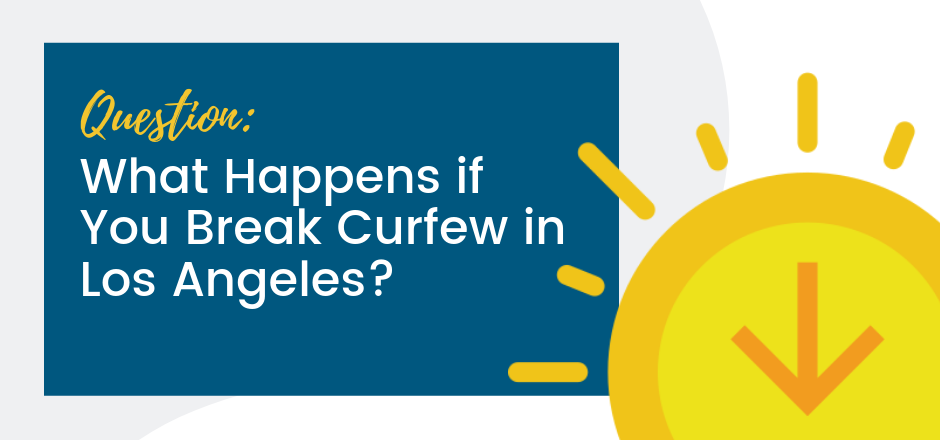Curfew Laws in Los Angeles: What Happens if You Break Curfew
Update: While there is no curfew relating to COVID-19, Los Angeles residents have been encouraged to stay home as much as possible. Learn more.
The city of Los Angeles has juvenile curfew law in place as a way of keeping minors out of trouble. Violating curfew laws usually result in fines but may also include court-ordered community service, driver’s license restrictions, and other penalties for repeat offenses.
Here’s what you need to know about curfew laws in Los Angeles, including exceptions and what happens if you break curfew.

Curfew Laws in Los Angeles
In Los Angeles, juvenile curfew laws prevent anyone under 18 from being present in public spaces overnight and during the standard school day. The goal of a curfew is to help maintain social order, keep the peace, and protect teens from serious harms, such as underage drinking, drugs, and predation on the street.
Parents should make educating teens on curfew laws a priority from an early age to help ensure compliance and keep them safe. If you are a teen or a parent who has questions about curfew ordinances, the consequences of a violation, or hiring a juvenile attorney, you have come to the right place.
Here’s what you need to know about curfew laws in Los Angeles …
The Definition of a “Public Space”
You know about the timeframes for daytime and nighttime curfews, and you know that they prevent teens from entering “public spaces.” But what exactly does this mean?
For all intents and purposes, you can assume the general definition is “anywhere not within the confines of a private residence.”
The LAPD defines “public spaces” as “any place open to the public during the hours of the day when the school, which the minor would normally attend, is in session.” This includes parks, parking lots, vacant lots, fields, restaurants, amusement areas, alleyways, and the street.
Daytime Curfew Law Specifics
Within Los Angeles, anyone under 18 must adhere to ordinance 45.04 (a) LAMC “Daytime Curfew.” This specifies that teens and children must not be present in public space at any time during their normal school hours. For example, if a teen attends a school open from 9 a.m. to 3 p.m., they must be either at school or within the confines of a private residence between these hours.
Weekends are generally not included under daytime curfew ordinances, as most schools don’t operate during these timeframes.
Nighttime Curfew Law Specifics
Nighttime curfew laws for juveniles are very similar to daytime guidelines; however, the time period is specified. Teens must be at home, within a residence, between the hours of 10:00 p.m. and sunrise. Curfew hours are the same for both weekdays and weekends and do not change until age 18.
Adhering to Curfew Laws
It is important to note that teens don’t necessarily need to be in their own home in order to fulfill the requirements of a curfew ordinance. They may choose to stay with a friend, at a family member’s house, or even in a hotel.
Furthermore, the definition of “indoors,” here, doesn’t necessarily have to mean “inside of the house.” It simply means “on the property.” Teens who spend time in the backyard, by the pool, or anywhere else on their property are still compliant.
Exceptions
There are exceptions that may exempt your teen from curfew regulations during special situations or circumstances. These “loopholes” are in place to ensure that teens have the ability to move around freely when the law deems it necessary.
- Emancipation: Teens who have been legally emancipated by the court under California Family Law are considered legal adults. Ergo, they are exempt from curfew regulations.
- Accompanied by a Guardian: Teens may travel freely at any time of the day or night if they are accompanied by a parent or guardian. In the case of teens who are married before 18, this also includes a spouse who is over 18.
- Errands: A parent or guardian may send a teen on an errand without the teen risking a violation. For example, a teen who travels to the store to buy milk and bread for a parent would be considered exempt. If the errand request occurs at night, it must qualify as an emergency (e.g., picking up medication from a local pharmacy) in order for the teen to be exempt.
- Employment: There is a reasonable expectation that teens will begin working at some point before they turn 18. In some cases, they may work during portions of the day or past 10 p.m. Both day and night curfew ordinances contain exceptions to exempt teens participating in activities related to work, including travel to and from a place of employment.
- Emergencies and Accidents: If the teen is out during curfew periods during the night or day as a direct result of an unavoidable emergency (e.g., a car accident, a fire, or a flood), they are exempt. This also includes any other emergent situation that requires some kind of immediate action.
- Medical Appointments: During the day, teens are exempted from curfew guidelines any time they travel to or from a medical appointment. This includes reasonable expectations for stopovers (e.g., stopping for lunch or to fill a prescription before heading home).
- Interstate Travel: Minors don’t need to adhere to the curfew guidelines if they are involved in interstate travel (e.g., leaving home at 5 a.m. to travel to the next state for a camping trip). Teens don’t necessarily need to be accompanied by an adult during travel but must obtain permission first.
- Lunch: Teens and children may leave school or campus grounds for lunch if they have permission from a parent or guardian. Minors must carry a current off-campus permit issued by the school at all times.
- Attending or Traveling to Entertainment: There is a reasonable expectation that teens will occasionally need leniency to travel to and from common public venues after or before curfew. An exemption allows teens to travel to and from movies, plays, public meetings, sports events, school events (e.g., dances), and other activities without violating the law.
- Exercising Rights: Teens who can quantifiably prove they are exercising their First Amendment rights are not violating curfew by doing so. For example, a teen who peacefully protests past 10:00 p.m. would qualify for this exemption.
- Authorized Exemption from School: In rare circumstances, teens may be authorized to be absent from school during the day by the law (e.g., during recovery from a serious injury or illness). Teens who qualify for this type of exemption from school are also exempted from daytime curfew guidelines.
What Happens if You Break Curfew
Minors who violate the daytime or nighttime curfew without a reasonable explanation may be stopped, or even arrested by the police. Generally, law enforcement officers will do everything they can to be reasonable; if there is a good reason for the encounter, your teen won’t likely be punished.
If, on the other hand, the teen does not have an explanation, and it becomes clear they willingly violated the ordinance, specific punishments apply. This includes being taken home to mom or dad, fines up to $675, community service, and driver’s license restrictions. Teens who are stopped for violating curfew should comply with police officers and request their parents be contacted at the earliest possible time.
If you or your child face a curfew offense, you may be interested in contacting an experienced juvenile attorney for help.
Are you in search for a certified attorney to represent you?
Let us help you find one today!



